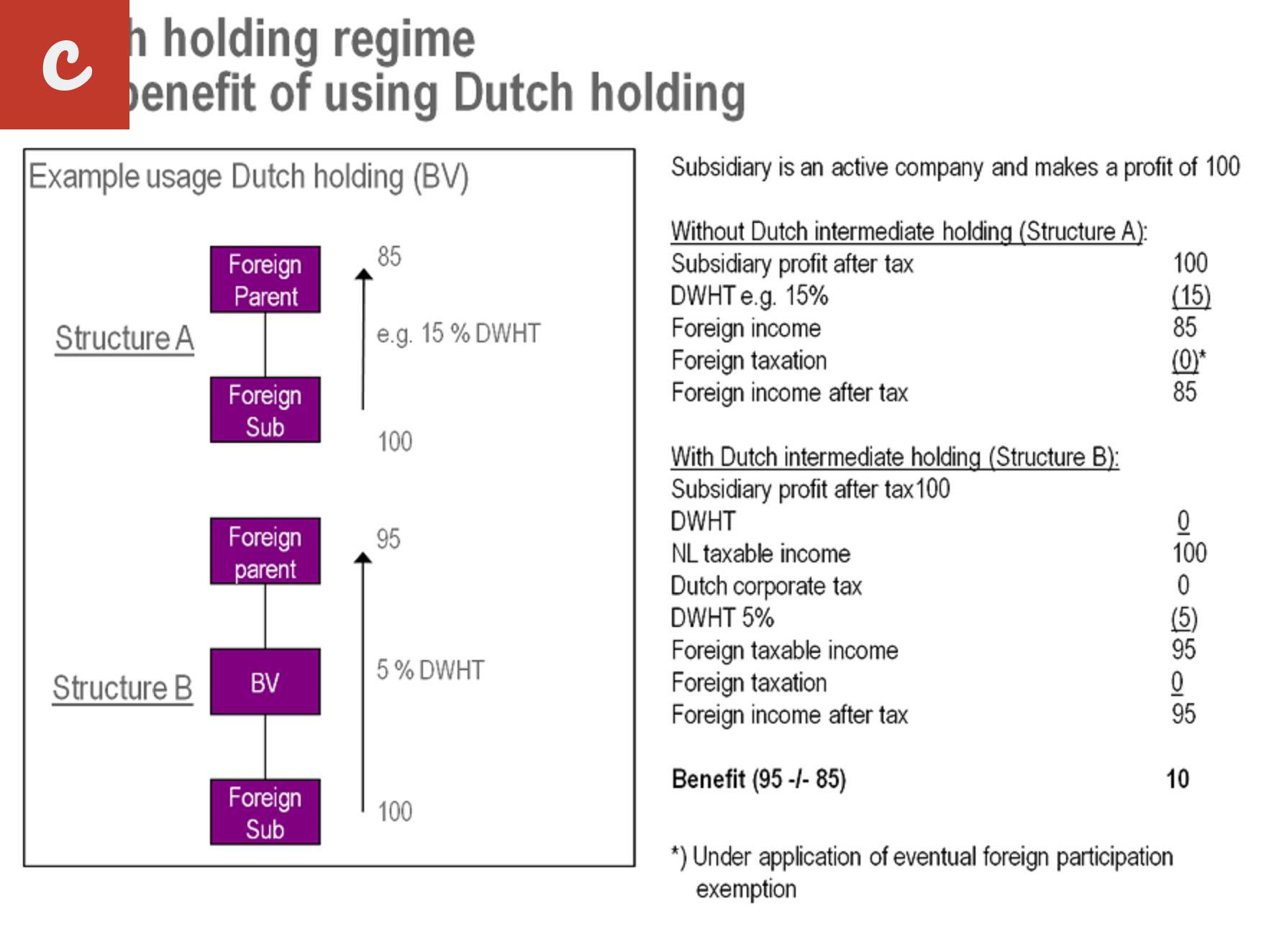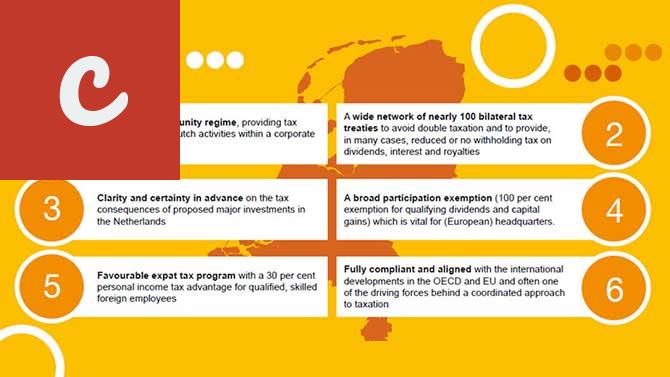Main Title
When considering Netherlands company formation, it is crucial to understand the tax system in place. The Netherlands has a favorable tax environment for businesses, making it an attractive location for companies looking to expand internationally.
One of the key benefits of setting up a company in the Netherlands is the competitive corporate tax rate. The standard corporate tax rate is 25% on profits up to €200,000 and 20% on profits exceeding that amount. This is relatively low compared to other European countries, making it an appealing option for businesses.
- **Tax Incentives:** The Netherlands offers various tax incentives to encourage business growth and innovation. These incentives include the innovation box, which allows for a reduced tax rate of 9% on profits generated from innovative activities.
- **Tax Treaties:** The Netherlands has an extensive network of tax treaties with other countries to prevent double taxation and provide tax relief for businesses engaged in cross-border activities.
Furthermore, the Dutch tax system is transparent and well-regulated, providing certainty for businesses operating in the country. The tax authorities are known for their efficiency and accessibility, making it easier for companies to comply with tax regulations.
In conclusion, understanding the tax system is essential when planning a Netherlands company formation. With its competitive tax rates, incentives, and efficient tax authorities, the Netherlands presents a favorable environment for businesses looking to establish a presence in Europe.
Understanding Tax Rules for Netherlands Company Formation
When it comes to setting up a company in the Netherlands, understanding the tax rules is crucial. Whether you are a local entrepreneur or a foreign investor, Netherlands company formation offers a range of benefits, but it is essential to navigate the tax landscape effectively. Here are some key points to consider:
- Tax Rates: The Netherlands offers a favorable tax environment for businesses. The corporate tax rate is relatively low compared to other European countries, making it an attractive destination for company formation.
- Tax Incentives: There are various tax incentives available for companies in the Netherlands, such as the Innovation Box regime, which offers a reduced tax rate for income derived from innovative activities.
It is important to note that tax rules and regulations can be complex, especially for non-resident companies. Seeking advice from tax professionals or legal experts with experience in Netherlands company formation can help ensure compliance and optimize tax efficiency.
Main Title
Setting up a company in the Netherlands can be a promising venture due to its strategic location, strong economy, and favorable business environment. However, one crucial aspect that every entrepreneur must carefully consider is understanding and complying with the tax regulations in the country.
**Tax regulations** in the Netherlands are known for being complex yet transparent. To successfully navigate through the nuances of the Dutch tax system, it is advisable to seek the assistance of local tax professionals who are well-versed in the intricacies of the law.
- Understanding the Dutch Corporate Income Tax (CIT) rates and regulations is essential for any company operating in the Netherlands. The standard CIT rate is currently set at 25% on taxable profits up to €200,000, and 20.5% on profits exceeding this threshold.
- Moreover, the Netherlands has an extensive network of double taxation treaties that aim to prevent businesses from being taxed twice on the same income. These treaties can significantly impact your tax liabilities and overall financial planning.
When establishing a company in the Netherlands, it is imperative to comply with Value Added Tax (VAT) regulations. **VAT** is applicable to most goods and services provided by businesses in the country. The standard VAT rate is 21%, with reduced rates of 9% and 0% applied to specific goods and services.
Furthermore, the Dutch tax system offers various incentives and tax deductions for businesses, such as the innovation box regime and the participation exemption. Understanding and utilizing these opportunities can help businesses optimize their tax positions and increase competitiveness.

Key Tax Considerations for Netherlands Company Formation
Are you considering setting up a company in the Netherlands? Understanding the tax implications of starting a business in the country is crucial for making informed decisions. The Netherlands has a favorable tax climate for businesses, but there are certain key tax considerations that you should keep in mind.
- Tax Residency: The concept of tax residency is important when establishing a company in the Netherlands. A company is considered a tax resident in the Netherlands if it is incorporated under Dutch law or has its central management and control in the country.
- Corporate Income Tax: One of the key tax considerations for businesses in the Netherlands is the corporate income tax rate. The standard corporate income tax rate is relatively low compared to other European countries, making the Netherlands an attractive location for businesses.
When setting up a company in the Netherlands, it is essential to understand the various tax incentives and rulings that may apply to your business. Consulting with a tax advisor can help you navigate the complexities of the Dutch tax system and ensure compliance with all regulations.
Understanding Taxes for Setting Up a Company in the Netherlands
Starting a company in the Netherlands can be an exciting venture, but navigating the tax requirements can seem daunting. **Taxes** are an essential part of doing business in any country, and the Netherlands is no exception. It is crucial to have a good understanding of the tax system to ensure compliance and avoid any potential issues down the road.
One of the key taxes that companies need to be aware of in the Netherlands is the corporate income tax. This tax is levied on the profits of Dutch resident companies and non-resident companies that have a permanent establishment in the Netherlands. The current corporate income tax rate in the Netherlands is 25% on profits up to €200,000 and 21.7% on profits exceeding this threshold.
- **Value-added tax (VAT)** is another important tax consideration for businesses in the Netherlands. VAT is charged on goods and services and the standard rate is 21%. There are also reduced rates of 9% and 0% that apply to certain goods and services.
- Businesses in the Netherlands are also subject to payroll taxes, which include social security contributions and wage tax. These taxes are levied on the salaries paid to employees and are the responsibility of the employer to withhold and remit to the tax authorities.
When setting up a company in the Netherlands, it is essential to register with the Dutch Tax and Customs Administration (Belastingdienst). This registration will ensure that your company is compliant with all tax obligations and will allow you to obtain the necessary **tax** identification numbers.
It is highly recommended to seek advice from a tax advisor or accountant when **setting up a company** in the Netherlands to ensure that you are fully compliant with all tax requirements. By understanding and complying with the tax regulations, you can focus on growing your business and avoid any potential penalties or issues in the future.




Comments on "Understanding The Tax System For Netherlands Company Formation"
No comment found!